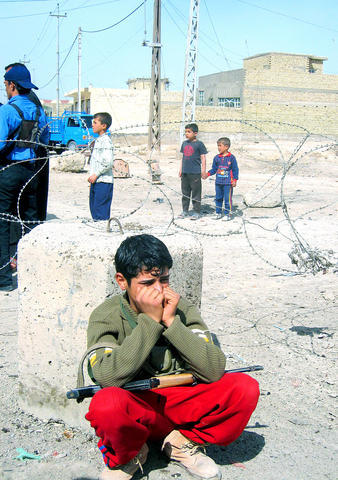A female suicide bomber killed the head of a local security group northeast of Baghdad yesterday, the targeted leader's brother and provincial police said. A child and a security guard were also killed.
The woman, wearing an explosives belt, entered the house of Sheik Thaeir Ghadhban al-Karkhi in the predominantly Sunni town of Kanaan, 20km east of Baqubah in Diyala Province, and blew herself up, said Duraid Mahmoud, the sheik's brother.
A provincial police official, speaking on condition of anonymity as he was not authorized to release the information, confirmed the attack.

PHOTO: AFP
There was no immediate claim of responsibility, but al-Qaeda in Iraq has been targeting fellow Sunni Arabs who have taken up arms against the militants and joined the so-called awakening councils like the one al-Karkhi led.
The councils are made up of US-backed former insurgents who have risen up against al-Qaeda's brutality and the strict Islamic codes of conduct it was trying to impose on local populations.
Mahmoud, the sheik's brother, said the bomber had visited the sheik's house on Sunday, claiming that her husband had been kidnapped and asking for help.
Mahmoud said his brother told the woman to return yesterday.
"She came back this morning and nobody checked her. She had an appointment with the sheik and the guards told her to go and knock on his door," Mahmoud said.
The woman was ushered into the house and blew herself up once she got close to the sheik, Mahmoud said.
Meanwhile, anti-US cleric Moqtada al-Sadr will remain in overall charge of his Shiite radical movement even as he steps back from its day-to-day operations to pursue his religious studies, aides said yesterday.
Sadr has no intention of quitting Iraqi politics despite the widespread perception that he was withdrawing after he admitted on Friday that there were splits within his movement, the aides said.
Sadr has "not ceased his contact with us and he remains in control of strategic decisions," said Liwa Sumaysim, the head of the movement's political bureau.
On Friday, the cleric admitted that some of the movement's leaders had broken away after he ordered a six-month extension to a freeze on the activities of its Mehdi Army militia which he first announced last year.
"Many of my close companions have departed for worldly reasons, some of them want to be independent," Sadr said.
"The fact that a number of people did not return to their hawza [religious school] and the fact that many are meddling in political lives while we thought they were loyal has made me isolate myself," he said.
Sadr's spokesman in Najaf, Sheikh Salah al-Obeidi, said the cleric's statement should not be seen as a decision to quit politics.
"The letter does not mean that Sadr wants to isolate himself from the political sphere," Obeidi said.
He has "found a new way to deal with day-to-day issues, focusing on the essentials, which is knowledge and religion, and following the events from a distance," Obeidi said.
Also see: Passing on the cost of conflict to future generations

‘TERRORIST ATTACK’: The convoy of Brigadier General Hamdi Shukri resulted in the ‘martyrdom of five of our armed forces,’ the Presidential Leadership Council said A blast targeting the convoy of a Saudi Arabian-backed armed group killed five in Yemen’s southern city of Aden and injured the commander of the government-allied unit, officials said on Wednesday. “The treacherous terrorist attack targeting the convoy of Brigadier General Hamdi Shukri, commander of the Second Giants Brigade, resulted in the martyrdom of five of our armed forces heroes and the injury of three others,” Yemen’s Saudi Arabia-backed Presidential Leadership Council said in a statement published by Yemeni news agency Saba. A security source told reporters that a car bomb on the side of the road in the Ja’awla area in

PRECARIOUS RELATIONS: Commentators in Saudi Arabia accuse the UAE of growing too bold, backing forces at odds with Saudi interests in various conflicts A Saudi Arabian media campaign targeting the United Arab Emirates (UAE) has deepened the Gulf’s worst row in years, stoking fears of a damaging fall-out in the financial heart of the Middle East. Fiery accusations of rights abuses and betrayal have circulated for weeks in state-run and social media after a brief conflict in Yemen, where Saudi airstrikes quelled an offensive by UAE-backed separatists. The United Arab Emirates is “investing in chaos and supporting secessionists” from Libya to Yemen and the Horn of Africa, Saudi Arabia’s al-Ekhbariya TV charged in a report this week. Such invective has been unheard of

US President Donald Trump on Saturday warned Canada that if it concludes a trade deal with China, he would impose a 100 percent tariff on all goods coming over the border. Relations between the US and its northern neighbor have been rocky since Trump returned to the White House a year ago, with spats over trade and Canadian Prime Minister Mark Carney decrying a “rupture” in the US-led global order. During a visit to Beijing earlier this month, Carney hailed a “new strategic partnership” with China that resulted in a “preliminary, but landmark trade agreement” to reduce tariffs — but

SCAM CLAMPDOWN: About 130 South Korean scam suspects have been sent home since October last year, and 60 more are still waiting for repatriation Dozens of South Koreans allegedly involved in online scams in Cambodia were yesterday returned to South Korea to face investigations in what was the largest group repatriation of Korean criminal suspects from abroad. The 73 South Korean suspects allegedly scammed fellow Koreans out of 48.6 billion won (US$33 million), South Korea said. Upon arrival in South Korea’s Incheon International Airport aboard a chartered plane, the suspects — 65 men and eight women — were sent to police stations. Local TV footage showed the suspects, in handcuffs and wearing masks, being escorted by police officers and boarding buses. They were among about 260 South